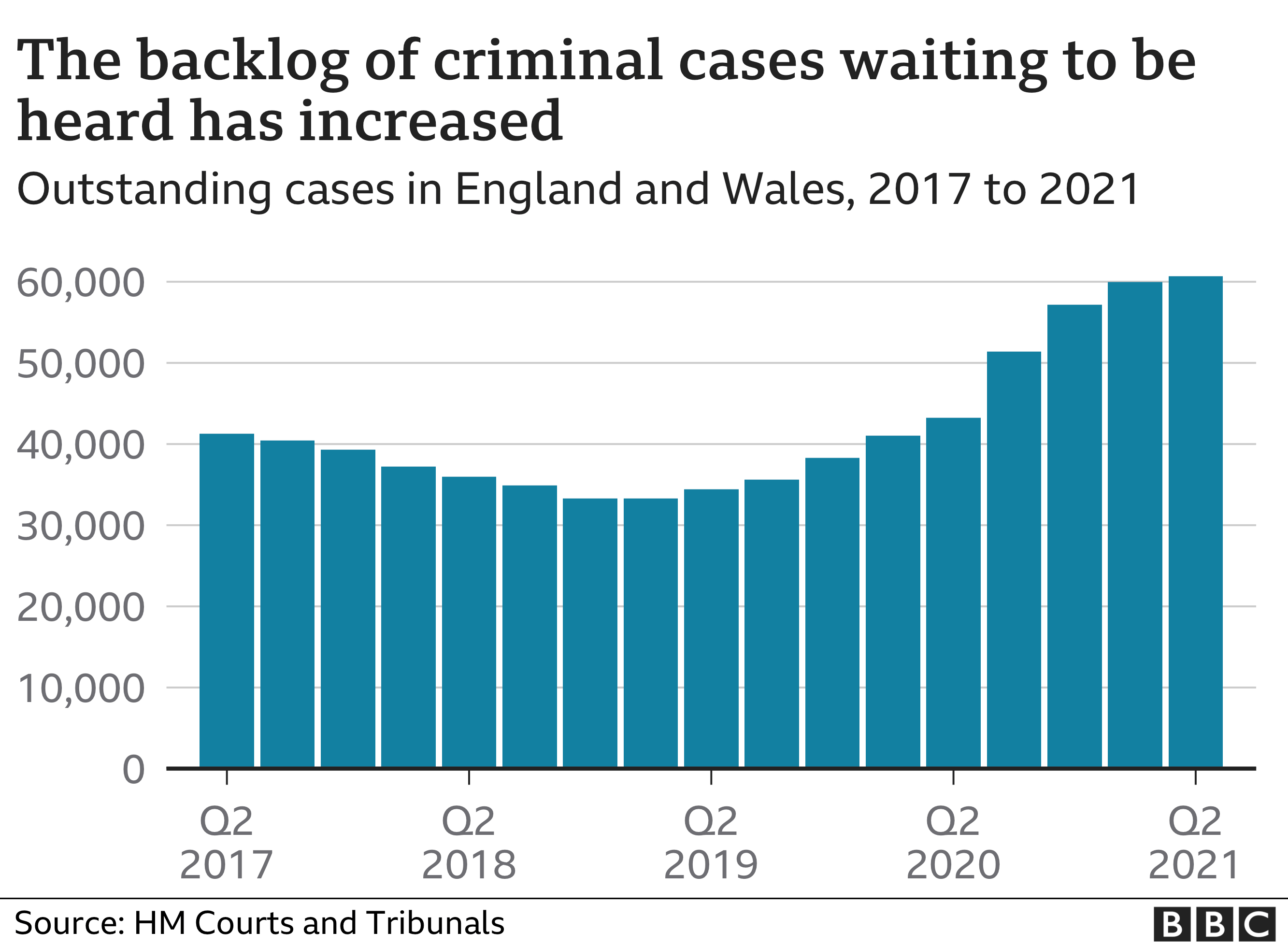In a bid to tackle court backlogs, magistrates in England and Wales will be able to jail criminals for longer.

Image source, Getty Images
Magistrates in England and Wales will be able to jail criminals for twice as long as they currently can, under plans to clear court backlogs.
The government is planning to allow magistrates to hand out sentences of up to a year, rather than six months.
Justice Secretary Dominic Raab says he hopes it will free up crown courts which are facing huge delays.
But criminal lawyers are predicting it could have the opposite effect.
Magistrates – who are volunteers with no legal experience – deal with less serious crimes, for example motoring offences, minor assaults and some thefts.
But they can only impose prison sentences of up to six months for a single offence. So when magistrates think defendants deserve a prison sentence of longer than six months, they have to hand the case to a judge.
The Ministry of Justice thinks that by doubling magistrates’ sentencing powers to a year, it can stop about 500 cases going to crown court – giving judges 2,000 extra days to handle more serious crimes.
The courts system is facing unprecedented delays – and as of June last year there was a record high of more than 60,000 crown court trials waiting to be heard.
Many serious cases are being pushed back until late 2023 – with alleged victims saying they are struggling to cope as they wait for their cases to be heard.

Mr Raab said the change would “provide vital additional capacity to drive down the backlog of cases in the crown courts over the coming years”.
“Together with the Nightingale courts, digital hearings and unlimited sitting days, we will deliver swifter and more effective justice as we build back a stronger, safer and fairer society after the pandemic,” he said.
Like Nightingale hospitals, Nightingale courts are temporary courtrooms – such as in hotels – that have been set up across England and Wales to try to deal with more cases.
‘A betrayal of victims’
Ministers plan to monitor how the extra powers for magistrates are used – but many lawyers predict it will backfire.
They say more defendants may appeal against sentences given by magistrates, many of whom have no legal qualifications – or there could be a spike in the prison population, further stretching the government’s budget.
The Bar Council, representing all barristers in England and Wales, also warned that more defendants may exercise their right to go before a jury – adding to the already enormous pressures in the system.
And the chairman of the Criminal Bar Association, Jo Sidhu, said “fiddling with magistrates’ sentencing powers is a betrayal of victims of crime”.
Stuart Matthews, partner at criminal defence firm Reeds Solicitors, also warned people to “be afraid” – describing magistrates as largely “untrained volunteers, many of whom do not understand even the most basic of legal principles”.
This video can not be played
To play this video you need to enable JavaScript in your browser.
Labour’s shadow courts and sentencing minister Alex Cunningham also criticised the move, calling it “another sticking plaster” solution.
“Ministers must give assurances that greater powers for magistrates won’t inflict even more burden on crown courts – with increased numbers of appeals overloading a diminishing number of criminal advocates left in the system.”
But magistrates say they are delighted.
The Magistrates’ Association – which had campaigned for sentencing powers to be extended – said magistrates would take up the new responsibility with pride and professionalism, and would “strive to deliver the highest quality of justice”.
The changes are expected to be brought in in the coming months.
They will only apply to either way offences – which are cases that can be dealt with either by magistrates or by judges at the crown court. A defendant charged with an either way offence can insist on the case being heard by a jury in a crown court if they wish.
The government said training will be provided by the Judicial College to make sure the powers are used “consistently and appropriately” – and the government will have powers to reverse the change if needed.
Last year, the spending watchdog the National Audit Office said the crown court backlog could remain a problem for years – and there could still be significant delays in 2024.
And in October, Mr Raab told the BBC he did not know when the backlog would drop below pre-pandemic levels.

- WHAT IS AN ‘ANTI-DIET’? The food movement that could change your attitude towards exercising
- FOR THE NHS, THE FIGHT GOES ON: How is the health service coping two years into the pandemic?
